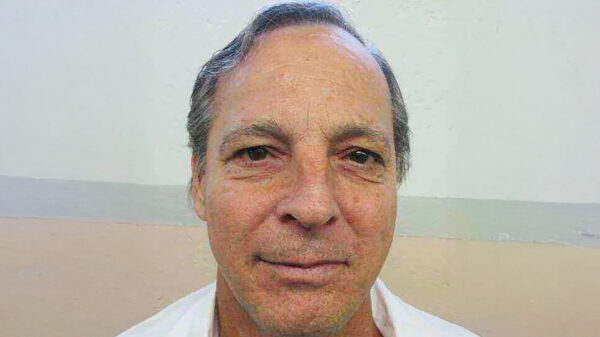At 8:25 p.m. on Thursday, Alabama became the first state in the U.S. to execute an individual using nitrogen hypoxia. This event marks a major milestone for a state run by a Republican supermajority that prides itself on pro-life and Christian values.
Kenneth Eugene Smith was executed by Alabama via nitrogen hypoxia for his role in the murder-for-hire plot of Elizabeth Sennett, which occurred in 1988.
Smith was never condemned to a fate of death by a jury of his peers, yet he was still executed by Alabama. The jury sentenced Smith to life in prison on an 11-1 vote, but a judge overrode the jury’s decision and sentenced Smith to death. In 2017, Alabama ended the practice of judicial override, yet Smith was still executed over a practice now deemed unnecessary.
Alabama previously attempted to execute Smith using lethal injection in November 2022 but botched it. However, they succeeded on Thursday after implementing the use of nitrogen hypoxia, which the state claims is humane.
Kim Chandler, a journalist with the Associated Press, detailed what she witnessed as the execution unfolded.
“The execution took about 22 minutes from the time between the opening and closing of the curtains to the viewing room,” Chandler wrote. “Smith appeared to remain conscious for several minutes. For at least two minutes, he appeared to shake and writhe on the gurney, sometimes pulling against the restraints. That was followed by several minutes of heavy breathing until breathing was no longer perceptible.”
Chandler also mentioned that Smith provided a final statement, saying: “Tonight Alabama causes humanity to take a step backward. … I’m leaving with love, peace, and light.”
While Smith and other critics may have viewed it as a step backward, for others, such as Alabama Attorney General Steve Marshall, it was a historic accomplishment.
“Alabama has achieved something historic,” Marshall said in a statement. “Like most states, Alabama has made the judgment that some crimes are so horrific that they warrant the ultimate penalty. But anti-death-penalty activists have worked to nullify that moral judgment through pressure campaigns against anyone assisting states in the process. They don’t care that Alabama’s new method is humane and effective because they know it is also easy to carry out. Despite the international effort by activists to undermine and disparage our state’s justice system and to deny justice to the victims of heinous murders, our proven method offers a blueprint for other states and a warning to those who would contemplate shedding innocent blood. This is an important night for Liz Sennett’s family, for justice, and for the rule of law in our great nation.”
However, in a video shared on X by the Woods Foundation, an anti-death penalty organization, Rev. Jeff Hood, Smith’s spiritual adviser who witnessed his death, described what he saw as an unbelievable evil.
“When they turned the nitrogen on, he began to convulse,” Hood said. “He popped up on the gurney over and over again. He shook the whole gurney. I could hear audible gasps coming from behind me in the witness area. I could see the corrections officers in there. I think they were very surprised that it didn’t go smoother. An unbelievable evil was unleashed tonight in Alabama. That was torture.”
Marshall is expected to hold a press conference with the media at 10 a.m. on Friday to address Smith’s execution.
Gov. Kay Ivey also released a statement following Smith’s execution: “On March 18, 1988, 45-year-old Elizabeth Sennett’s life was brutally taken from her by Kenneth Eugene Smith. After more than 30 years and attempt after attempt to game the system, Mr. Smith has answered for his horrendous crimes. The execution was lawfully carried out by nitrogen hypoxia, the method previously requested by Mr. Smith as an alternative to lethal injection. At long last, Mr. Smith got what he asked for, and this case can finally be put to rest. I pray that Elizabeth Sennett’s family can receive closure after all these years dealing with that great loss.”
In a press conference on Thursday evening, Kenneth’s wife, Deanna Smith, provided her thoughts and said that the country does not believe in the Constitution.
“While everybody was waiting for Christmas, all excited about Christmas, our family was waiting for the courts to decide the fate of my husband and whether he was going to suffer or were they going to stand up and do the right thing,” Deanna said, according to the Alabama Reflector. “We say we are a country that believes in the Constitution, and I am sorry, but I just don’t see that.”
The U.S. Supreme Court denied Smith’s petition for a stay on Thursday evening, allowing the state to carry out his execution. None of the justices who voted to deny the stay issued an opinion.
Justice Sonia Sotomayor issued a harsh rebuke of Smith’s execution in her dissenting opinion.
“Having failed to kill Smith on its first attempt, Alabama has selected him as its ‘guinea pig’ to test a method of execution never attempted before,” Sotomayor said. “The world is watching.”
And the world was watching leading up to Thursday as many human rights organizations, anti-death penalty advocates and experts warned against Alabama enacting Smith’s execution. One organization, Amnesty International USA, released a statement following Smith’s execution condemning the death penalty and Ivey for allowing it to occur.
“Nothing happened here today that’s going to bring Mom back,” Mike said. “It’s kind of a bittersweet day. We’re not going to be jumping around, hooting and hollering ‘hooray’ and all that; that’s not us. We’re glad this day is over.”



















































